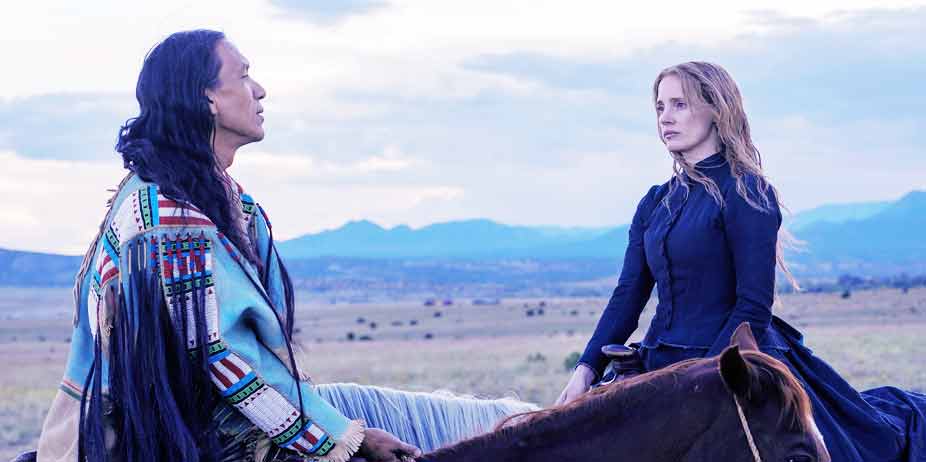
Woman Walks Ahead (2018)
This biopic, helmed by a woman and beautifully directed, turns out to be more of an unconsummated romance than a straight up historical drama. It plays fast and loose with history but also is a stirring and emotional glimpse into the last few months of a man’s life.
Catherine Wheldon (Jessica Chasdain) has lived a life of repression, since her husband decided proper ladies do not paint. With him cold in the ground for a year and her mourning at an end, without asking permission from any of the other men in her life, she boards a train and heads for “Indian Territory” on a quest to paint the great chief, Sitting Bull (Michael Grayeyes). Meeting with hostility from the townspeople and Reservation officials alike, she refuses to leave until she has a meeting with the quiet, soft-spoken, but thrifty chief, who wheedles a thousand dollars out of her in exchange for the honor to paint his portrait.
The stubborn “white woman” and Sioux chief butt heads over whether she will walk or ride, whether she walks ahead of or beside him, what he’ll wear in the portrait, and how much of her tortured past she is willing to share, all while the government schemes to force the Indians to reach settlement that would rob them of more land. Catherine soon becomes involved, at the risk of her own life and safety.
I liked a lot of things about this film. It’s about a plucky feminist and her friendship (though it does at times have romantic undertones) with a man who has, by his own admission, “learned to swallow my anger, it goes down like rocks in my throat.” It has beautiful cinematography, and a slow but invigorating pace, as it helps you to know these two people better. The cast is excellent, the writing solid, and it captures the real Sitting Bull’s blend of wisdom and anger, causing the audience to empathize with him despite all his violent deeds. The scene where he shows Catherine his paintings, one for each year of his life to mark significant moments, especially resonates with feeling.
It works as a historical novel set to film, but of course has been drastically changed from the original story – here, Catherine is widowed, in real life she was divorced because she left her husband for another man, and came to the territories with her teenage son. Both she and Sitting Bull were twenty years older than their on-screen counterparts, and she was more an activist than a painter, though she did both. There was no romantic attraction, and in fact Sitting Bull refused to speak with her after a time, causing her to leave the reservation before his murder.
The script is so solid, and the moments of emotionality so intense, I question the need to garner it an R-rating through using two f-words (not common verbiage in the wild west at the time). The rest of the content is light enough I’m surprised it wasn’t PG13. It’s an emotional tale about an unconventional woman who earns her “Indian name” through true grit, and a chief who knows his time, and that of his people, is reaching its end.
Sexual Content:
Sitting Bull changes into his tribal garments in front of
Catherine, who averts her eyes (the camera sees him blurry and to the
background, nude from the side and back). He teases her about whether or not she
would get naked in front of him. A man tells Catherine he hopes the Indians rape
her and cut her baby from her stomach.
Language:
Two f-words, one used sexually; a few scattered profanities
(damn, hell, etc).
Violence:
A man throws a rock at a woman, striking her on the side of
the face and causing her to bleed; another man drags her into a side street,
punches her in the face several times, throws her to the ground, and kicks on
her; he pees on the ground, then rubs the mud into her face. She limps away from
town after a woman tells her "they're looking for a rope" (to hang you with). A
man talks about killing people, and shows a woman paintings of violence. A man
is shot in the chest and killed.
Other:
Various historical inaccuracies.
